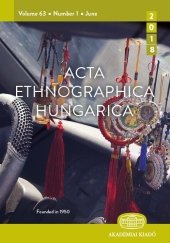The Hungarian Táltos and the Shamanism of Pagan Hungarians. Questions and Hypotheses
The Hungarian Táltos and the Shamanism of Pagan Hungarians. Questions and Hypotheses
Author(s): Éva PócsSubject(s): Cultural Anthropology / Ethnology, Sociology of Religion, History of Religion
Published by: Akadémiai Kiadó
Keywords: táltos; weather wizard; dragon man; folk beliefs; pre-Christian religion; shamanism; heroic epic; Balkans; Turkic shamanism
Summary/Abstract: One of the purposes of this study is to outline the research problem related to the wizard called táltos and a hypothesized shamanism in the pagan, pre-Christian religion of the Hungarians. Another purpose is to present the results of new research on this issue. The first part of the study is the analysis of the activities of a weather wizard called táltos from the 16th to the 21st century, as well as its related beliefs and narrative motifs. Then I present the process in the course of which researchers of the pre-Christian pagan “ancient religion” – Gyula Sebestyén, Géza Róheim, Sándor Solymossy, Vilmos Diószegi and others – created the fictitious construct of the táltos and reconstructed the Conquest-era shaman in line with the model compiled from the attributes of shamanism of various periods and various peoples. The criticism of Vilmos Diószegi’s construct of the táltos is followed by the introduction of new research results. Their main points: modern táltos beliefs and narratives show many correlations with Balkan – especially Bulgarian – folk beliefs and folk epics. The táltos and táltos-epics show the closest correlation with the beliefs of Bulgarian dragon-men who were fathered by a dragon or eagle and born with wings or other animal traits, as well as with the adventures of heroes of epic songs who slay the dragons of the underworld and are protected by the spirit of the eagle, dragon, rooster, crane, etc. We also need to consider the infl uences of Slavic storm wizard practices and the werewolf beliefs and narratives of the Balkans. The infl uences of Balkan peoples on Hungarian culture are indubitable, partly the result of the Bulgaro-Turkic relations between the 5th and 9th centuries and partly the consequences of Slavic relations after the Conquest. It is likely that at the time of the Hungarian Conquest, there was a weather magic practice similar to those of the Balkan dragon-men, as well as a weather wizard called táltos. However, the construct of the research tradition represented by Diószegi must be refuted: there is no evidence of a shaman-táltos similar to the “classic” Eurasian shaman who was initiated in the world tree and established contact with the spirit world through a ritual performance, in a drum-induced ecstasy.
Journal: Acta Ethnographica Hungarica
- Issue Year: 63/2018
- Issue No: 1
- Page Range: 149-196
- Page Count: 48
- Language: English
- Content File-PDF

